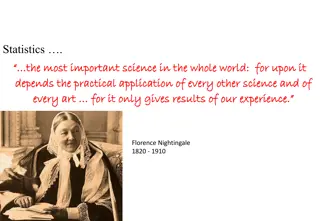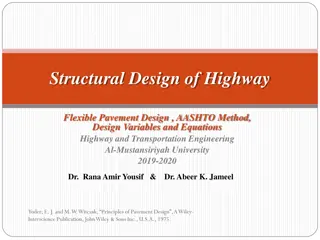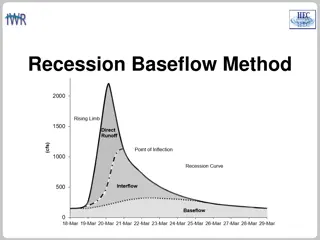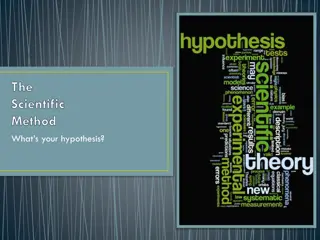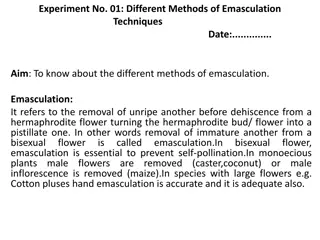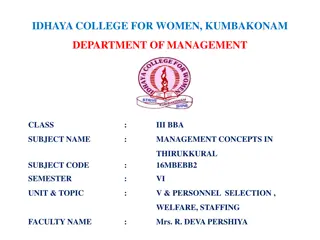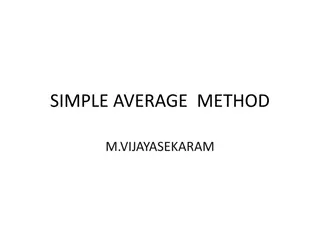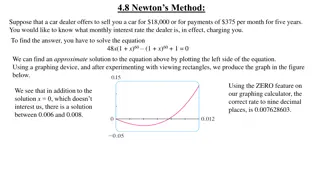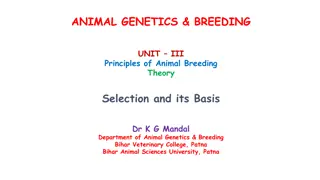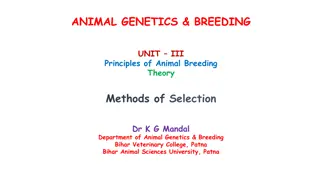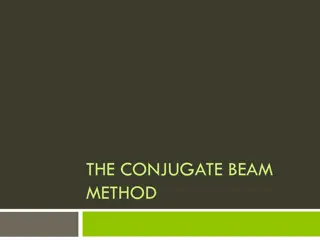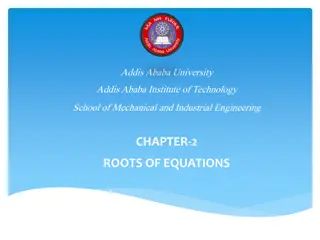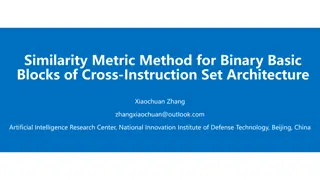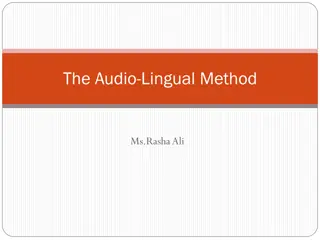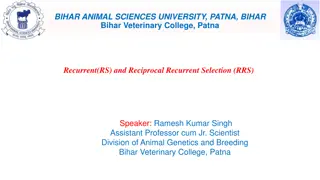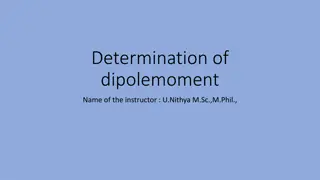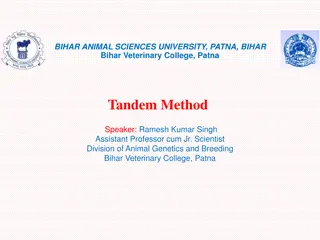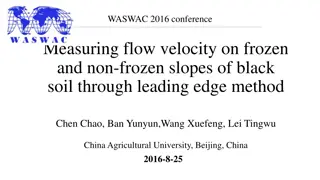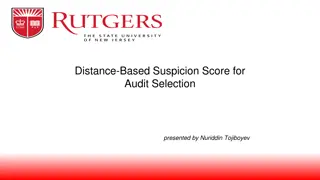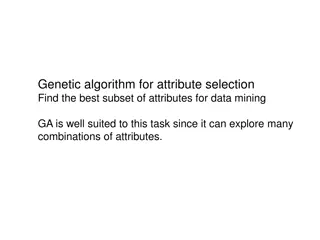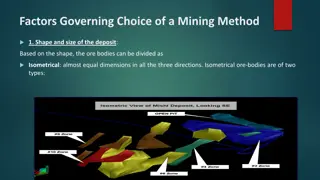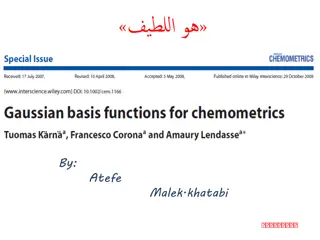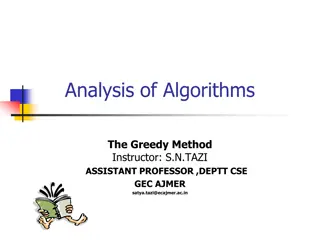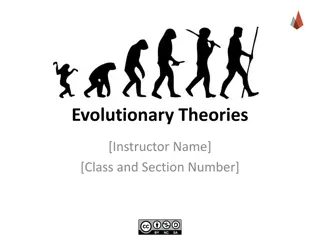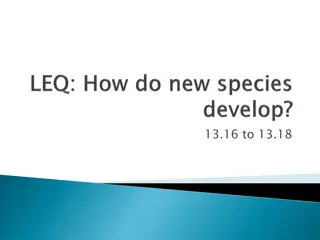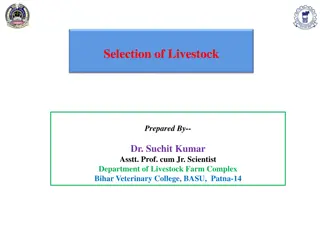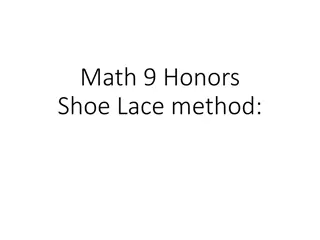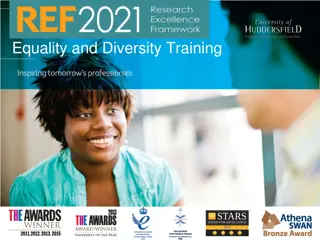Language Teaching Techniques: GTM, Direct Method & Audio-Lingual Method
Explore the Grammar-Translation Method, Direct Method, and Audio-Lingual Method in language teaching. Understand principles, objectives, and methodologies with insights into language learning approaches. Enhance teaching skills and foster effective communication in language education.
3 views • 82 slides
INDIAN ARMY AGNIVEER SELECTION PROCESS 2024
https:\/\/youtube.com\/shorts\/3Errhs-10LM?si=gWwlhucXivM1v02s\n\n\n\nIndian Army Agniveer Selection Process 2024\nManasa Defence Academy is proud to offer the best Army training programs, including the NDA Crash Course (6 Months) and NDA Advance Course (1 Year). In this blog post, we will explore t
3 views • 1 slides
Understanding Logistic Regression Model Selection in Statistics
Statistics, as Florence Nightingale famously said, is the most important science in the world. In this chapter on logistic regression, we delve into model selection, interpretation of parameters, and methods such as forward selection, backward elimination, and stepwise selection. Guidelines for sele
4 views • 33 slides
AASHTO Method for Highway Flexible Pavement Design
The AASHTO method for highway flexible pavement design is based on the AASHO Road Test results and has been revised over the years to provide guidelines for pavement structural design. It emphasizes performance period, time constraints, and design variables to ensure long-lasting and cost-effective
1 views • 25 slides
Understanding the Recession Baseflow Method in Hydrology
Recession Baseflow Method is a technique used in hydrology to model hydrographs' recession curve. This method involves parameters like Initial Discharge, Recession Constant, and Threshold for baseflow. By analyzing different recession constants and threshold types such as Ratio to Peak, one can effe
0 views • 8 slides
Understanding the Scientific Method: A Logical Framework for Problem-Solving
The Scientific Method is a systematic approach used to solve problems and seek answers in a logical step-by-step manner. By following key steps such as stating the problem, researching, forming a hypothesis, testing, analyzing data, and drawing conclusions, this method helps clarify uncertainties an
1 views • 18 slides
Introduction to Six Thinking Hats Method for Effective Group Decision Making
Explore the Six Thinking Hats method, a powerful tool for facilitating group discussions and decision-making processes. This method encourages participants to approach problems from various perspectives represented by different colored 'hats'. By simplifying thinking and fostering constructive dialo
1 views • 24 slides
Understanding Corn Growth Stages: Leaf Staging Methods and Considerations
Various leaf staging methods, including the Leaf Collar Method and Droopy Leaf Method, are used to identify corn plant growth stages. The Leaf Collar Method involves counting leaves with visible collars, while the Droopy Leaf Method considers leaves at least 40-50% exposed from the whorl. Factors li
0 views • 9 slides
Understanding Different Emasculation Techniques in Plant Breeding
Learn about the significance of emasculation in plant breeding to prevent self-pollination and facilitate controlled pollination. Explore various methods such as hand emasculation, forced open method, clipping method, emasculation with hot/cold water, alcohol, suction method, chemical emasculation,
2 views • 10 slides
Management Concepts in Personnel Selection and Welfare at Idhaya College for Women, Kumbakonam
The Department of Management at Idhaya College for Women in Kumbakonam offers insights into the importance of personnel selection in organizations. The process of personnel selection involves hiring individuals with the required qualifications to fill vacant positions. Proper selection and placement
0 views • 20 slides
Simple Average Method in Cost Accounting
Simple Average Method, introduced by M. Vijayasekaram, is a technique used for inventory valuation and delivery cost calculation. It involves calculating the average unit cost by multiplying the total unit costs with the number of receiving instances. This method simplifies calculations and reduces
2 views • 5 slides
Understanding Newton's Method for Solving Equations
Newton's Method, also known as the Newton-Raphson method, is a powerful tool for approximating roots of equations. By iteratively improving initial guesses using tangent lines, this method converges towards accurate solutions. This method plays a crucial role in modern calculators and computers for
0 views • 12 slides
Principles of Animal Breeding: Selection and its Basis
Selection in animal breeding involves choosing the best individuals to improve specific traits. Criteria for selection include individual merit, competitive exams, and interviews. Selection of farm animals focuses on non-random reproduction of genotypes. Types of selection include natural and artifi
1 views • 40 slides
Principles of Animal Breeding Theory and Methods of Selection
Animal breeding involves selecting for desirable traits to improve the overall merit of animals. Methods such as tandem selection and multi-trait selection are used to enhance genetic progress. Economic value, genetic significance, and selection criteria play important roles in the breeding process.
1 views • 16 slides
Understanding the Conjugate Beam Method in Structural Analysis
The Conjugate Beam Method is a powerful technique in structural engineering, derived from moment-area theorems and statical procedures. By applying an equivalent load magnitude to the beam, the method allows for the analysis of deflections and rotations in a more straightforward manner. This article
1 views • 11 slides
Understanding Roots of Equations in Engineering: Methods and Techniques
Roots of equations are values of x where f(x) = 0. This chapter explores various techniques to find roots, such as graphical methods, bisection method, false position method, fixed-point iteration, Newton-Raphson method, and secant method. Graphical techniques provide rough estimates, while numerica
0 views • 13 slides
Binary Basic Block Similarity Metric Method in Cross-Instruction Set Architecture
The similarity metric method for binary basic blocks is crucial in various applications like malware classification, vulnerability detection, and authorship analysis. This method involves two steps: sub-ldr operations and similarity score calculation. Different methods, both manual and automatic, ha
0 views • 20 slides
Exploring the Audio-Lingual Method in Language Teaching
The Audio-Lingual Method is an oral-based approach that focuses on drilling students in grammatical sentence patterns through behavioral psychology principles. This method, also known as the Michigan Method, emphasizes habit formation and uses techniques like dialogues, repetition drills, and role-p
1 views • 16 slides
Recruitment and Selection Process in Human Resource Management
Recruitment and selection are vital processes in human resource management. Recruitment involves attracting candidates for job positions within an organization through various sources, both internal and external. The steps in recruitment include planning, strategy development, searching, screening,
0 views • 6 slides
Understanding Selection Strategies in Animal Genetics and Breeding
Genes influence traits through Additive Gene Action (AGA) and Non-Additive Gene Action (NAGA) in animal breeding. Recurrent Selection (RS) and Reciprocal Recurrent Selection (RRS) play crucial roles in improving animals. Selection for General Combining Ability (GCA) and Specific Combining Ability (S
0 views • 16 slides
Determination of Dipole Moment in Chemistry
The determination of dipole moment in chemistry involves methods such as the Temperature Method (Vapour Density Method) and Refractivity Method. These methods rely on measuring various parameters like dielectric constants and polarizations at different temperatures to calculate the dipole moment of
1 views • 15 slides
Tandem Method in Animal Breeding: Sequential Traits Selection
Tandem method in animal breeding involves selecting useful traits sequentially to improve genetic performance. Breeders focus on one trait until a desired level is achieved before moving on to the next trait. While effective in targeted improvement, the method can lead to loss of previously improved
0 views • 6 slides
Selection Board Training and Human Resources Responsibilities in Hawaii National Guard
This document outlines the agenda for the Selection Board Training conducted by the Hawaii National Guard Human Resources Office. It covers recruitment, selection processes, decision-making, and job offer responsibilities. References to relevant U.S. Codes and Acts are provided. The structure of the
0 views • 48 slides
Measurement of Flow Velocity on Frozen and Non-Frozen Slopes of Black Soil Using Leading Edge Method
This study presented a detailed methodology for measuring flow velocity on frozen and non-frozen slopes of black soil, focusing on the Leading Edge method. The significance of shallow water flow velocity in soil erosion processes was emphasized. Various methods for measuring flow velocity were compa
0 views • 23 slides
HelmholtzCloud Service Selection Process Overview
The Helmholtz Cloud Service Selection Process is detailed through service surveys, iterations, criteria types, and exclusion processes. Service providers deliver data, weighting and selection criteria are applied, and candidate services are listed based on surveys and integrations. Criteria categori
0 views • 41 slides
Distance-Based Suspicion Score for Audit Selection
Nuriddin Tojiboyev presented a method for audit selection based on distance measures, risk filtering, and exception sorting. The approach involves selecting representative samples from a population of records, using risk-based filtering to prioritize records for review. Various filters and exception
0 views • 19 slides
Genetic Algorithm for Attribute Selection in Data Mining
Genetic algorithm (GA) is a powerful method for attribute selection in data mining as it efficiently explores numerous attribute combinations. By choosing the most important features and ignoring the rest, GA can enhance the data analysis process through methods like feature extraction and artificia
0 views • 41 slides
Factors Influencing Mining Method Selection
Factors affecting the selection of a mining method include the shape and size of the deposit, the deposit's contact with country rock, thickness of the ore body, and the dip of the deposit. The shape of the deposit, contact with country rock, and thickness of the ore body impact the feasibility and
0 views • 14 slides
Enhancing Internet Telephony Quality Through Predictive Relay Selection
Examining the quality of Internet telephony in relation to network performance, this research explores the use of Managed Overlay to improve call quality for services like Skype. Analysis of 430 million Skype calls reveals that a significant portion experience poor network performance, emphasizing t
1 views • 26 slides
Functional Approximation Using Gaussian Basis Functions for Dimensionality Reduction
This paper proposes a method for dimensionality reduction based on functional approximation using Gaussian basis functions. Nonlinear Gauss weights are utilized to train a least squares support vector machine (LS-SVM) model, with further variable selection using forward-backward methodology. The met
0 views • 23 slides
Overview of Greedy Method in Algorithm Analysis
The Greedy Method in algorithm analysis involves making locally optimal decisions that eventually lead to a globally optimal solution. This method is illustrated through examples such as finding the shortest paths on special and multi-stage graphs, and solving the activity selection problem. While t
0 views • 16 slides
Understanding Evolutionary Theories and Strategies
Exploring evolutionary theories such as Sexual Selection Theory and Gene Selection Theory sheds light on how characteristics evolve for mating advantage. Insights into intersexual and intrasexual competition offer a deeper understanding of mate selection preferences. Gene selection mechanisms influe
0 views • 20 slides
Understanding Natural Selection and Its Mechanisms
Explore the concepts of natural selection, survival of the fittest, and various types of selection processes in evolutionary biology. From the struggle for existence to sexual selection, learn how organisms adapt to their environment through genetic contributions and mating strategies. Discover exam
0 views • 8 slides
Student of the Year Guidelines and Selection Process Overview
Explore the revised 2020 Student of the Year guidelines, understand the selection process for Grades 5, 8, and 12, learn about scoring form revisions, LEA roles, components, paperwork submission, and more. Get insights on starting the selection process and completing necessary forms. Discover how in
0 views • 23 slides
Brigade Commander and Staff Selection Process Decision Briefing
In the decision briefing for the selection process of APS JROTC Brigade Commander and Staff, the purpose is to determine the best process that meets the needs, constraints, and preferences. The plan is to implement a standardized nomination and evaluation process in the selection of Brigade Commande
0 views • 18 slides
Understanding Selection Methods in Livestock Breeding
Livestock breeding involves various methods of selection such as individual selection, pedigree selection, progeny selection, and more. These methods aim to improve desirable traits in animals through controlled breeding programs. Selection criteria include performance, genetic lineage, and specific
0 views • 27 slides
Understanding the Shoe Lace Method for Finding Polygon Areas
The Shoe Lace Method is a mathematical process used to determine the area of any polygon by employing coordinate geometry. By following specific steps, including organizing coordinates, multiplying diagonally, and adding columns in a certain manner, the method allows for a straightforward calculatio
0 views • 8 slides
Combined Classification and Channel Basis Selection with L1-L2 Regularization for P300 Speller System
This study presents a method that combines classification and channel basis selection using L1-L2 regularization for the P300 Speller System. The approach involves EEG signal processing, feature extraction, P300 detection, and character decoding. The proposed method aims to improve decoding accuracy
0 views • 17 slides
Vigil Nomination and Selection Process Overview
The Vigil Nomination and Selection Process involves processes at both the chapter and lodge levels, including the appointment of chairman and adviser, duties of the nominating committee, eligibility criteria, survey letters, nominee selection, completing nomination forms, and deadlines for submissio
0 views • 30 slides
Challenges in Staff Selection for Equality and Diversity in Academic Institutions
Despite some progress, challenges persist in the selection of staff in academic institutions, particularly concerning under-selection of minority ethnic staff and those with disabilities. The report highlights disparities in selection rates based on gender, age, nationality, and ethnicity. Addressin
0 views • 27 slides


